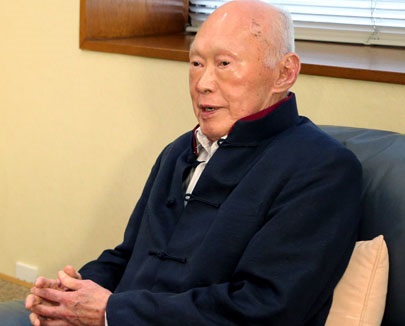By Tom Plate
From Los Angeles


Lee Kuan Yew, whom I first interviewed in 1996, was always a terrific interview and if you ask Western journalists how many public figures they can say this of, you may be surprised at how few they name. But I cannot think of one journalist who left Istana after an interview with Lee disappointed. I even tell my university students that one clear sign of an utter lack of journalistic talent would be to conduct an interview with Singapore’s first prime minister that came out dull.
Many public figures like to dodge tough questions but, if asked in a proper way, Lee is the reverse: He relishes the challenge. He does not want for intellectual self-confidence, he is not intimidated by the Western journalist, and he will generally say what he thinks.
In the hours of intense interviews for Conversations with Lee Kuan Yew, the 2010 book that was the first in the Giants of Asia series, Lee overtly ducked only one question (the identity of the three holdover cabinet ministers who had been unhappy and who wished to bail on his successor Goh Chok Tong) and when the his full quotes were presented to him for review (his standard policy – but he never asks to see what will actually be published), wished to have removed three comments he worried would create diplomatic problems for his son, the prime minister. One of those concerns (his outspoken view on ethnic cleansing in Sri Lanka) he agreed could be left in when I strongly protested that this view had to be included.
Edgy aides
In all the half-dozen interviews over the years Lee was always rational and reasoned, though he could be abrupt. It seemed to me during the conversations for the book in summer 2009 that the pair of aides present were in a constant state of nervous edginess, whether over fear of what I might ask of him or of what their boss might bark at them. But the then-senior minister, though suffering various ailments, answered questions with a laser-like attentiveness to the main points. It was this extraordinary talent for articulation that made it possible to construct a book about him over two mere afternoons, whereas much more time was needed for the ‘Giants of Asia’ books that followed (Mahathir, Thaksin, Ban Ki-moon).
Some critics felt the book was too favorable or soft – and some even got the mistaken impression that I thought Lee a perfect human being and Singapore a perfect place. To some extent that was my fault, but to a greater extent it was due to the nature of the ‘conversations’ approach to the book. You see, by reputation (if to a lesser extent by reality), American journalists are viewed as aggressive types. That comes both from the legacy of the Watergate era, when persistent investigative journalism toppled a U.S. president, and from the norms of the U.S. system, which by custom and First Amendment endow the news media with an independence role. In style, too, the push-down-the-door, mike-in-the-face style always been de rigueur. American journalists like to think of themselves as where Clint Eastwood might meet Ernest Hemingway. (Yeah, right….)
Yet the cowboy approach doesn’t always work; and in fact it sometimes works only to deny American reporters interview access. In the past decade I know in particular of at least two very well known sitting prime ministers in Asia who walked out on Western journalists expecting a lengthy interview session. It is difficult to relax a leader whom you wish to be candid and lengthy when your opening question is along the lines of: ‘How corrupt are you and when were you first corrupt’?
First American journalist who…
For his part, of course, a corruption question would never arise about Singapore (a tremendous achievement when you think about it) but Lee had been known to despise Western journalists whose sole homework for the interview would be to review negative human-rights reports and dreary old clips about caning and chewing gum. As far as I know Lee never denied me an interview if he was in town and available and I once asked an aide why. The answer was something like- For one thing you were the first American journalist who didn’t try to tell him how to run Singapore!
I once asked him why he bothered with an interview with me. He responded with a look as if I were crazy: “Because it is my job to influence the people who influence people’s opinions about Singapore.” The response was telling. For all his enormous towering and sometimes-scary ego, he cared most about making his little country look good and important.
And so on the occasion of his 90th birthday, why don’t we tell him that he did a very good job of that.
Why not indeed?

